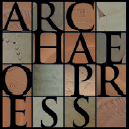
Publishing Scholarly Archaeology since 1997

Download Sample PDF
H 290 x W 205 mm
482 pages
487 figures, 8 maps (colour throughout)
German text
Published Dec 2021
ISBN
Paperback: 9781789698367
Digital: 9781789698374
Keywords
Dogs; Antiquity; Roman; Archaeozoology; Zooarchaeology; Classics; Iconography; Literary Sources
Related titles





Archaeopress Roman Archaeology 84
Hunde in der römischen Antike: Rassen/Typen - Zucht - Haltung und Verwendung
By Heidelinde Autengruber-Thüry
Paperback
£70.00
Includes PDF
PDF eBook
(personal use)
£16.00
PDF eBook
(institutional use)
£70.00
This study considers the living environment of the dog in Roman antiquity, based on literary and iconographic sources as well as archaeological and archaeozoological finds. The book asserts that dogs played an important role in many areas of life, such that everyday life in the Classical world could not be imagined without them.
Contents
Vorwort und Danksagung ;
Einleitung ;
A. Allgemeiner Überblick über den Wissensstand der Antike zum Thema Hund ;
1. Hunderassen/-typen ;
2. Hundezucht ;
3. Hundenamen ;
4. Unterbringung und Aufenthaltsorte von Hunden ;
5. Hundezubehör ;
6. Ernӓhrung des Hundes ;
7. Krankheiten und medizinische Versorgung des Hundes ;
8. Grabgedichte und Grabinschriften ;
9. Hundebestattung/Kadaverentsorgung ;
B. Vertiefende Betrachtung einzelner Aspekte ;
10. Hauptverwendungszwecke der Hunde ;
11. Weitere Aufgabenbereiche der Hunde ;
12. Der Hund als Rohstofflieferant ;
13. Besondere Eigenschaften ;
14. Die Liebe zum Hund ;
15. Hunde als wertvolle Objekte ;
16. Zusammenfassung ;
17. Anhang ;
18. Abkürzungsverzeichnis ;
19. Bibliographie ;
20. Quellenverzeichnis ;
21. Stellenregister ;
22. Internetquellen ;
23. Bildnachweis ;
Addenda
About the Author
Heidelinde Autengruber-Thüry completed her studies in history at the University of Vienna with a master's degree (with distinction) in 1999 and a doctorate in 2017. She acquired her specialist practical and theoretical knowledge in the field of cynology through many years of collaboration with the Irish Setter Club of Austria.auf Deutsch
Heidelinde Autengruber-Thüry legt hier die Druckfassung ihrer Dissertation vor. Sie hat ihr Studium der Geschichte an der Universität Wien jeweils mit Auszeichnung im Jahr 1999 mit dem Magister- und im Jahr 2017 mit dem Doktorgrad abgeschlossen. Ihr praktisches und theoretisches Fachwissen auf dem Gebiet der Kynologie hat sie durch langjährige Mitarbeit im Irish Setter Club Austria erworben.
Reviews
'Ms. Autengruber-Thüry's work combines the quantity of information with its quality and gives the scientific community the reference work that was hitherto lacking in this field... Reading this book was a real pleasure, which brought me a lot of knowledge, starting with the introduction to specialized vocabulary rarely covered in ordinary studies.' [translated] – Marion Muller-Dufeu (2023): Histara
‘A colossally rich book, even if written in a drier manner than the topic perhaps deserves, Hunde in der römischen Antike will help to steer in the right direction the pursuits of any student of ancient dogs, or, indeed, of other domesticated animals.’ – Catalin Pavel (2023): American Journal of Archaeology Vol. 127

 Add to wishlist
Add to wishlist
